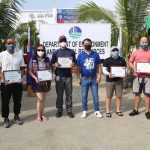Ipinahayag ng Department of Environment and Natural Resources (DENR) na nakamit ng mga rehistradong negosyante ang target nitong 20 porsiyento na pag “divert” ng plastic sa pamamagitan ng mga hakbang tulad ng recycling sa unang taon ng pagpapatupad ng Expanded Producers’ Responsibility (EPR) Act, na makatutulong sa pagsagip ng kalikasan mula sa pagkasira.
“We give credit to private enterprises for achieving significant strides toward the shared goal of building a circular economy where waste is minimized, resources are protected, and the delicate balance of our planet is restored,” ang sabi ni Environment Secretary Maria Antonia Yulo Loyzaga sa isang keynote speech na mensahe para sa World Environment Day and Philippine Environment Month na may titulong “ Linking Opportunities and Partnerships Towards Circular Economy” sa SM Masinag, Antipolo.
Ayon sa DENR-Environmental Management Bureau (EMB), tinatayang umaabot sa 624,547 tonelada ng “unaudited footprint” ng plastics ng taong 2023 tulad ng mga nagamit na plastic cups, straws, at kahalintulad ang naiulat, samantalang 20 porsiyento naman nito o 124,986 tonelada ng plastic packaging ang naiulat na diverted.
Naisagawa ng mga nagnenegosyong ito na maisakatuparan ang 20 porsiyentong target na makatulong sa pagbabawas ng plastic na basura na nakasisira sa kalikasan sa pamamagitan ng maayos na waste collection at diversion, kabilang ang ilang hakbang tulad ng recovery, transportation, at cleanup efforts sa mga coastal areas ng bansa.
Naniniwala si Yulo-Loyzaga na kayang maabot pa ng Pilipinas ang target nito na 80 posiyento diversion ng plastic packaging sa taong 2028.
“The early gains have been made in less than two years since the enabling law, Republic Act 11898 or the Extended Producer Responsibility (EPR) Act, came into force in 2022.
Circular economy is about the practice of reducing, reusing and recycling, a 1970s concept of 3Rs which has appeared to be modified and improvised in 2013 through a report entitled Towards the Circular Economy: Economic and Business Rationale for an Accelerated Transition, commissioned by the Ellen MacArthur Foundation,” sabi ni Yulo-Loyzaga.
Sa ilalim ng umiiral na EPR law, ang mga negosyo ay may requirement na magsagawa ng tamang pamamahala ng mga basura na mula sa plastic packaging products nito tulad ng sachets, rigid plastic packaging products, plastic bags, at polystyrene.
Iniulat din ng EMB na 37 porsiyento ng mga negosyo na rehistrado sa ilalim ng EPR program ay tumaas din ang bilang mula sa 667 ng taong 2023 sa 917 na mga kompanya nitong May 6, 2024.
Sa ilalim ng EPR Act, ang target recovery ng mga plastic product footprint ng 2023, ay 20%; 2024, 40%; 2025, 50%; 2026, 60%; 2027, 70%; at, 2028, 80%.
Ma. Luisa Macabuhay-Garcia









